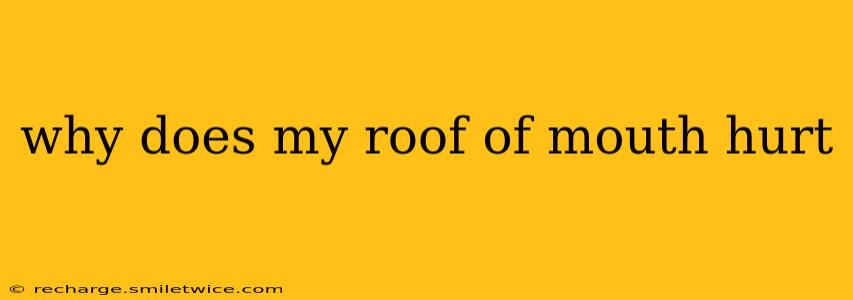A sore roof of the mouth, medically known as the palate, is a common complaint with various potential causes. Understanding the source of your discomfort is crucial for effective treatment. This guide will explore the most frequent reasons for palate pain, helping you identify the likely culprit and seek appropriate relief.
What Could Be Causing My Palate Pain?
The pain in your roof of your mouth can range from mild discomfort to intense throbbing. The underlying cause determines the severity and type of pain. Let's delve into some common culprits:
1. Injuries and Trauma:
- Burns: Hot food or drinks are the most frequent cause of palate burns. The intensity of the pain depends on the temperature and duration of exposure. Minor burns typically heal within a few days, while more severe burns might require medical attention.
- Cuts or Abrasions: Accidental cuts from sharp foods or objects can cause pain and bleeding. These injuries usually heal quickly with proper care.
- Bites: Accidental biting of the palate can be quite painful. The injury might bleed slightly and take a few days to heal.
- Dental Work: Procedures like dental extractions, fillings, or orthodontic adjustments can sometimes lead to temporary irritation or soreness on the palate.
2. Infections:
- Oral Thrush (Candidiasis): A fungal infection caused by Candida albicans, often manifesting as white patches on the palate accompanied by pain and burning. This is more common in individuals with weakened immune systems or those taking antibiotics.
- Viral Infections: Some viral infections, like herpes simplex virus (HSV), can cause painful sores or blisters on the palate.
- Strep Throat: While primarily affecting the throat, strep throat can sometimes cause discomfort in the palate region.
3. Dry Mouth (Xerostomia):
A lack of saliva can irritate the tissues of the palate, leading to dryness, burning, and discomfort. This is often associated with medications, certain medical conditions, or dehydration.
4. Allergies:
Allergic reactions to certain foods or substances can trigger inflammation and irritation in the mouth, including the palate.
5. Canker Sores (Aphthous Ulcers):
These small, painful ulcers often appear inside the mouth, including on the palate. The exact cause isn't fully understood, but stress, hormonal changes, and nutritional deficiencies are potential contributing factors.
6. Other Conditions:
- Geographic Tongue: This benign condition causes patches on the tongue to appear smooth and red, but can sometimes extend to the palate, causing a slight burning sensation.
- Lupus: In some cases, lupus can affect the mouth, leading to pain and lesions on the palate.
- Certain Medications: Some medications can have side effects that include mouth sores or palate irritation.
How Long Does Palate Pain Last?
The duration of palate pain varies significantly based on the underlying cause. Minor burns or injuries typically heal within a few days. Infections may require medication and could last for several days or weeks. Chronic conditions might cause persistent pain.
When Should I See a Doctor?
Seek medical attention if your palate pain:
- Is severe or persistent.
- Is accompanied by fever, swelling, or difficulty swallowing.
- Doesn't improve after a few days of home care.
- Is accompanied by other concerning symptoms.
Home Remedies for Palate Pain:
For minor palate discomfort, try these home remedies:
- Saltwater Rinse: Gently rinse your mouth with warm salt water several times a day.
- Ice Chips: Sucking on ice chips can numb the area and reduce pain.
- Over-the-Counter Pain Relievers: Ibuprofen or acetaminophen can help manage pain.
- Avoid Irritants: Avoid hot foods, acidic drinks, and spicy foods that can irritate the affected area.
This information is for general knowledge and does not constitute medical advice. Always consult a healthcare professional for diagnosis and treatment of any medical condition. They can accurately determine the cause of your palate pain and recommend appropriate treatment options.
